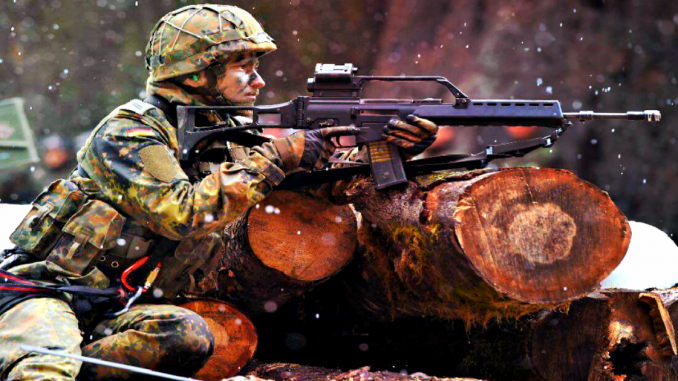
| Published April 2,2025
Europe is facing a major security shift with its first foreign military deployment since WWII, as foreign troops are now stationed across the continent in response to escalating tensions with Russia. This historic move aims to strengthen NATO’s defense posture in the face of ongoing conflicts in Eastern Europe, especially the war in Ukraine.
The deployment has sparked concerns about potential conflict escalation, as Russia views NATO’s expansion as a direct threat. Tensions are high, and the presence of foreign forces on European soil could lead to accidental clashes or deliberate confrontations. The situation is made more complex by the involvement of other global players like China and Turkey.

File photo shows German troops at the Julius Leber Barracks in Berlin, April 24, 2024
With both sides bracing for potential escalation, the stakes are higher than ever. The deployment, while aimed at strengthening NATO’s defense capabilities, also risks further destabilizing the region. Experts caution that any miscalculation could ignite broader conflict, particularly given the delicate balance of power between global and regional powers.
The ongoing situation serves as a stark reminder of the precarious state of international relations in Eastern Europe. As NATO bolsters its presence, the question remains whether diplomacy will prevail or if this historic move will lead to a new chapter of international conflict. The world will be watching closely to see how this situation unfolds and whether efforts to avert further escalation can succeed.

A Leopard 2 main battle tank of the German armed forces Bundeswehr shoots during a training exercise in Ostenholz, Germany on October 17, 2022
IMPLICATIONS
The implications of Europe’s first foreign military deployment since WWII are significant and multifaceted:
1. Increased Tensions with Russia
The deployment has heightened tensions between NATO and Russia, as Moscow perceives it as a direct challenge to its influence over Eastern Europe. Russia’s warnings of potential military responses add uncertainty to the situation, with fears of a possible escalation into an open conflict between NATO and Russian forces.
2. Risk of Escalation
The stationing of foreign troops increases the risk of accidental or deliberate military clashes. Even minor skirmishes could lead to a broader regional conflict, drawing in other global powers, such as China, Turkey, or the U.S., which would have wider international consequences.

German soldiers take part in the international military exercise ‘Grand Quadriga 2024’ at a training range in Pabrade, in Vilnius, Lithuania on May 29, 2024
3. Destabilization of Eastern Europe
The military presence in Eastern Europe could further destabilize the region, particularly if other countries perceive the deployment as an infringement on their sovereignty or regional balance. Countries like Ukraine, which have already been embroiled in conflict, could experience a further exacerbation of their security concerns.
4. Shift in NATO Strategy
NATO’s move to station foreign troops represents a shift in its strategic defense posture, signaling the alliance’s intent to be more proactive in deterring Russian aggression. However, it also indicates a more confrontational stance, which could redefine future alliances and military deployments.
5. Economic and Political Repercussions
The deployment may lead to economic strain, particularly if it prompts a military buildup in response from Russia or other countries. Increased defense spending, sanctions, or disruptions to trade could further hurt the global economy, especially in energy markets. Politically, the deployment may polarize public opinion in NATO member states, leading to internal debates over the merits of escalating tensions with Russia.

Smoke rises following a Russian kamikaze drone attacks on Dnipro, Ukraine on March 29, 2025
6. Global Power Dynamics
The military buildup may shift the dynamics of global power, as countries like China, with its own interests in the region, could use this as a means to influence NATO’s actions. The broader geopolitical landscape may see a reshuffling of alliances as nations position themselves in response to the heightened conflict.
7. Long-Term Stability of Europe
The deployment could have lasting impacts on the stability of Europe. If it sparks a prolonged confrontation with Russia, it could lead to sustained military presence and conflicts in the region, potentially destabilizing European security for years to come. Conversely, it could also lead to more diplomatic efforts aimed at de-escalation, depending on the responses from all parties involved.
OVERALL TAKEAWAY
The deployment of foreign troops in Europe for the first time since WWII marks a critical turning point in the region’s security landscape. It underscores the escalating tensions between NATO and Russia, highlighting the fragile balance of power in Eastern Europe. While NATO’s move aims to strengthen defense against Russian aggression, it also carries significant risks of military escalation, political polarization, and economic disruption.
The situation is a reminder of the high stakes involved, with the potential for both heightened conflict and diplomatic breakthroughs. As global powers watch closely, the outcome of this historic development could reshape Europe’s security dynamics, influence future geopolitical alliances, and determine the stability of the region for years to come.
SOURCES: THE GATEWAY PUNDIT -POWDER KEG EUROPE: In First Foreign Deployment Since WW2, Germany to Station 5,000 Troops in Lithuania as Latest Escalation Against ‘Russian Threat’
DAILYMAIL ONLINE – Germany looks to bring back conscription as country’s top general warns it is the only way it can prepare for Russian invasion





Be the first to comment